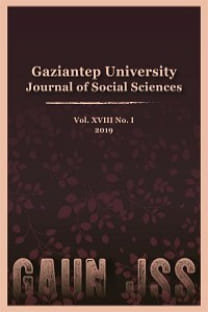David Greig’in Europe/Avrupa Adlı Eseri: Küreselleşme, Hareketlilik ve Sığınmacılık
Tanınmış İskoçyalı tiyatro yazarı David Greig eserlerinde günümüz dünyasında hareketliliğin çeşitli türlerini anlatır. Bu çalışmanın amacı, David Greig’in temel olarak hareketlilik, seyahat ve göç konularını ele aldığı Europe (Avrupa) oyununu Una Chaudhuri’nin “geopathology” kavramını kullanarak yorumlayarak, esere yeni bir bakış açısı kazandırmaktır. Chaudhuri bir insanın mekan kaynaklı sıkıntılarını anlatmak için “geopathology” ve“geopathic bozukluk” terimlerini benimsemiştir. Greig birçok eserinde günümüz dünyasında çeşitli sebeplerden dolayı yer değiştirmek ve göç etmek zorunda kalan sığınmacıların hayatlarına dikkat çekmektedir. 1994 yılında yazdığı Europe (Avrupa) oyunu 1990lı yıllarda Balkanlardaki çalkantılı ve huzursuz dönemi anlatmaktadır. Bu çalışma geopathology, hareketlilik, seyahat, ve kimlik gibi konuları Greig’in Europe eserinin ortak temaları olarak keşfederek, Avrupa mitinin hem bir ütopya hem de bir distopya olduğunu gösterir. Çalışma ayrıca, Avrupa’nın bir geopathology sembolü olduğu, ütopik bir geleceği temsil ettiği, ayrıca Avrupa kavramının evsizlik, yurtsuzluk, köksüzlük ve hareketlilik ile ilgisini araştırır. Eser “geopathology” yani mekan sorunsalını dramatik ve yapısal bir araç olarak kullanarak, günümüz dünyasının göçmenlik sorununun aciliyetine dikkat çekmektedir.
Anahtar Kelimeler:
David Greig, Europe, Hareketlilik, Geopathology
David Greig’s Europe: Staging Globalization, Mobility and Refugehood
The acclaimed Scottish playwright David Greig depicts contemporary mobility of various kinds. Focusing principally on mobility and travel in David Greig’s Europe, this paper aims at exploring the notion of “geopathology” in Una Chaudhuri’s sense, and thus brings a new perspective in the interpretation of the play. Chaudhuri has appropriated the term “geopathology” and “geopathic disorders” to describe the suffering caused by one’s location. Greig is fascinated with the contemporary world which is determined by actual dislocations of immigration and refugehood. His 1994 play Europe alludes to the Balkan unrest in the 1990s, and this paper attempts to explore such isues as geopathology, mobility, travel, and identity as the connecting substance of Greig’s Europe. The paper describes the Europe myth both as utopia and dystopia with the following themes: Europe as a symbol of geopathology, Europe as the embodiment of a utopic future, and Europe as the language of homelessness, rootlessness and hence mobility. It will be argued that the play incorporates “geopathology” as a dramatic and structural device and calls for an urgency for the contemporary refugee problem.
Keywords:
David Greig, Europe, Mobility, Geopathology,
___
- Bauman, Z. (2012). To nie jest dziennik. Kraków: Wydawnictwo Literackie.
- Billingham, P. (2007). Inhabitants of the tide mark – towards a new political poetics in the plays of David Greig. In P. Billingham (Ed), At the sharp end: Uncovering the work of five contemporary dramatists: David Edgar, Tim Etchells, David Greig, Tanika Gupta, Mark Ravenhill, 94-123: London: Methuen.
- Blanford, S. (2007). Film, drama and the break-up of Britain. Chicago: University of Chicago Press.
- Brennan, T. (1990). The national longing for form. In H. Bhabha (Ed.), Nation and narration, 44-52: London: Routledge.
- Brown, I. (2011). Edinburgh companion to Scottish drama. Edinburgh: Edinburgh University Press.
- Chaudhuri, U. (1997). Staging place: The geography of modern drama. Ann Arbor: The University of Michigan Press.
- Czajka, A. (2016). Europe’s other: Europe, europeanisation and the refugee. 10 January 2019, http://www.academia.edu/26086813/Europes_Other_Europe_Europeanisation_and_the_Refugee.
- Derrida, J. (1992). The other heading: Reflections on today’s Europe. Indiana: Indiana UP.
- Derrida, J. (2001). On cosmopolitanism and forgiveness. London: Routledge.
- Dillon, M. (1999). The scandal of the refugee: Some reflections on the ‘inter’ of international relations and continental thought. In D. Campbell and M. Shapiro (Eds), Moral spaces: Rethinking ethics and moral politics, 92-124: Minneapolis: University of Minnesota Press.
- Giddens, A. (1990). The consequences of modernity. Cambridge: Polity.
- Greig, D. (1996). Europe/The Architect. London: Methuen.
- Güvenç, S. (2018). “Biz de, kendi çapımızda Avrupayız”: Küreselleşme Işığında David Greig’in Avrupa Adlı Oyunu, DTCF Dergisi, 58 (1), 187-202.
- Holdsworth, N. (2003). Travelling across borders: Re-imagining the nation and nationalism in contemporary Scottish Theatre. Contemporary Theatre Review, 13(2), 25-39.
- Lyotard, J. F. (1999). The other’s rights. In S. Hurley and S. Shute (Eds), On human rights, (35-149: New York: Basic Books.
- Meerzon, Y. (2005). Every home is its own private Moscow: Between geopathology and nostalgia in Olga Mukhina's?/ You. Slavic and East European Journal, 19(4), 639-658.
- Müller, A. (2005). We are also Europe: Staging displacement in David Greig's plays. In C. Houswitschka and A. Müller (Eds), Staging displacement, exile and diaspora, 151-168: Trier: Wissenschaftlicher Verlag Trier.
- Müller, A. and C. Wallace. (2011). Cosmotopia: Transnational identities in David Greig’s theatre. Prague: Litteraria Pragensia Books.
- Pattie, D. (2007). Lost in Europe: David Greig’s One Way Street and Europe. In R. D’Monte and G. Saunders (Eds), Cool Britannia?: British political drama in the 1990s, 149-153: New York: Palgrave MacMillan.
- Rebellato, D. (2002). Introduction. In D.Greig, Plays: 1, 16: London: Methuen.
- Reinelt, J. (2001). Performing Europe: Identity formation for a ‘new’ Europe. Theatre Journal, 53, 365-387.
- Rosenberg, J. (2005). International politics. Globalization theory: A post mortem, (2-74). Oxford: Blackwell.
- Taylor, P. (1999). There’s no place like home. 10 January 2019, https://www.independent.co.uk/arts-entertainment/theatre-theres-no-place-like-home-1090115.html.
- Wallace, C. (2013). The theatre of David Greig. London: Bloomsbury.
- Zenzinger, P. (2005). David Greig’s Scottish view of the new Europe: A study of three plays. In C. Houswitschka and I. Detmers (Eds), Literary views on post-wall Europe: Essays in honour of Uwe Böker, 261-282: Trier: WVT.
- ISSN: 1303-0094
- Yayın Aralığı: Yılda 4 Sayı
- Başlangıç: 1991
- Yayıncı: Gaziantep Üniv. Sosyal Bilimler Enst.
Sayıdaki Diğer Makaleler
Bir Alt Kültür Grubu Olarak Denizli Grafiti Gençliği
Çocuklu Ailelerin Dışarıda Yeme Alışkanlıkları
Özgür İrade Üzerine Bir Çalışma: Joseph Conrad’ın Batılı Gözler Altında Romanında Kim Neyi Görüyor?
Jane Eyre, Uğultulu Tepeler ve Büyük Umutlar’da Siyasal Bilinçdışı
İhsan Hün’ün Askeri Tarih Adlı Eseri ve Askeri Tarih Yazımındaki Yeri
Türkiye’de Gelir Dağılımının Çevre Kirliliği Üzerindeki Etkileri Üzerine Bir İnceleme
